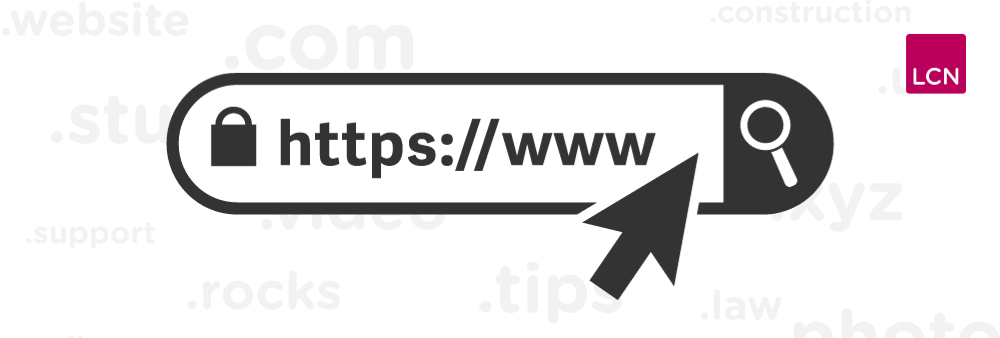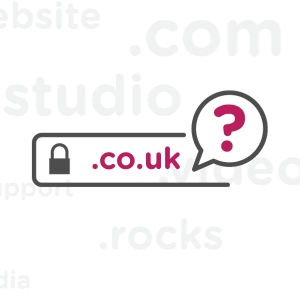How to choose a domain name is possibly one of the most important questions you’ll ask yourself when starting your online business. As your online identity, it can have a huge impact on your success.
But what factors should you consider when choosing the right domain name? What should you look out for and what are the best practices for domain name selection in 2023?
We’ll answer these questions and more in this post, by sharing with you our 7 top tips for choosing a domain that works for your business – but more importantly, your audience.
Table of contents
Keep your domain name short and simple
– Why it’s important
Make your domain name relevant and memorable
– How do you make your domain name relevant and memorable?
Think about the future
Check your domain name’s availability and legality
– Is your domain being used on social media?
Choose the right domain name extension
– Think about alternative extensions
Research your domain name
– Questions to ask yourself
Register your domain name
– Price
– Features
– Customer service
– Security
– Reputation
Summary
1. Keep your domain name short and simple
One of the most basic rules for choosing a domain name is to keep it short and simple. Ideally, your domain name should be no longer than 15 characters and should be easy to spell and pronounce.
www.thelongestdomainnameintheworldandthensome.com may be fun, but your customers would have trouble remembering it, not to mention typing it correctly!
Why it’s important
According to a study by Gaebler.com, the top 100,000 websites have an average of 9.1 characters in their domain names, with the top 1,000 websites having an average of 7 characters. Their research suggests that shorter domain names tend to perform better online.
Of course, it’s not easy to find a short and simple domain name that hasn’t already been registered, especially if you’re looking for a .com extension. You may want to think about using other extensions, such as .co.uk, .net, .online, or .shop, that are more likely to be available and relevant for your business.
2. Make your domain name relevant and memorable
When choosing a domain name, it’s important to consider its relevance and memorability. Your domain name should reflect your brand identity and what you offer. It should also be catchy and memorable, so that it stands out and sticks in your visitors’ minds.
How do you make your domain name relevant and memorable?
One way is to use keywords in your domain name that describe your business and the benefits or services you provide. Keywords can help you rank higher on search engines, attract more organic traffic, and communicate what it is you have to offer.
For example, if you’re a personal trainer, you might want to use keywords like fitness, health, or workout in your domain name. Some examples would be fitnesspro.com, healthcoach.com, or workoutzone.com.
Another option you can use is to choose a brandable domain name that’s unique and creative. A brandable name can help you stand out from your competitors, build a loyal customer community, and create a strong identity for your business.
For example, if you’re a travel agency, you might want to use a brandable name that evokes a sense of adventure, fun, or discovery. Some example domains using this method are wanderlust.com, tripster.com, and explore.com.
3. Think about the future
When choosing a domain name, you should also think about the future of your business and the industry you’re in. Don’t limit yourself by choosing a domain name that is too specific. As your business grows, you may want to expand the services your offer or target a different audience. Make sure you pick a domain name that gives you room to grow.
For example, let’s say you’re starting a blog about vegan recipes. You might be tempted to choose a domain name like veganrecipes.com. However, this might restrict your options if you decide to later branch out into other veganism related topics, like lifestyle, health, or activism.
A better option might be to choose a more general domain name such as veganspot.com or veganworld.com, which will allow you to cover a wider range of topics and reach a broader audience.
4. Check your domain name’s availability and legality

Before you register your domain name, make sure it’s not already taken by someone else or infringing on any trademarks. You can use our domain availability checker to search for available domains and compare prices.
Is your domain name being used on social media?
You should check if there are any existing websites or social media accounts that use the same or similar names as yours. If there are, perhaps consider using a different name. You don’t want to confuse or compete with them for traffic or reputation. Using a tool like Namechk.com can help you save time here.
Additionally, avoid using any names that are offensive, misleading, or illegal. You wouldn’t want to get into any trouble with the law or damage your perception and credibility with your customers.
5. Choose the right domain name extension
The extension is the part of the domain name that comes after the dot, such as .com, .co.uk, .online, etc. Different extensions have different meanings and purposes, so choose one that suits your business and audience.
The most popular and widely used extension is .com. It’s the default choice for most businesses, as it’s easy to remember and trusted by users. However, you’ll likely find it’s the most competitive extension, so you might have a hard time finding a .com domain that’s available.
Think about alternative domain extensions
If you can’t find a .com domain that you like, you can consider using other extensions that are more specific and relevant to your business. For example, you can use .net for technology, .org for non-profit, .edu for education, or .gov for government.
You can also use extensions that are based on your location or country, such as .co.uk for the United Kingdom, .ie for Ireland, .ca for Canada, or .in for India. These extensions can help you target local customers and rank higher on local search results.
Alternatively, you can use extensions that are based on your industry or category, such as .shop for e-commerce, .blog for blogging, or .art for, you guessed it, art. These extensions can help you highlight your business and what you do.
6. Research your domain name
Once you’ve chosen a domain name that you like, you should do some research to make sure it’s a good fit for your business and your audience.
Questions to ask yourself
Here are some questions to ask yourself when researching your domain name:
- Does it convey the right message and tone for your brand?
- Does it appeal to your target market and customer persona?
- Does it match your website design and content?
- Does it sound good when spoken aloud?
- Does it look good when written down?
- Does it have any negative associations or connotations?
- Does it have any spelling or pronunciation issues?
- Does it have any potential legal or trademark problems?
You can also get feedback from your friends, family, or colleagues to see what they think of your domain name. They may see something about the name that you might have missed.
7. Register your domain name
When you’re happy that you’ve chosen the perfect domain name for your business, the final step in is to register it with a reliable and reputable domain name registrar. A domain name registrar is a company that sells and manages domain names.
There are many domain name registrars to choose from, but not all of them are equal. Some of them might offer low prices but have poor customer service, security, or features. Some of them might also try to upsell you with unnecessary add-ons or services.
What you should look for
Price
How much does the domain name cost per year? Are there any hidden fees or charges?
Features
What features are included with the domain name? Do you get email accounts, website hosting, privacy protection, etc.?
Customer service
How responsive and helpful is the customer service? Do they offer accessible support via phone, email, or chat?
Security
How secure is the domain name registrar? Do they protect your personal and financial information? Do they offer domain locking and auto-renewal options?
Reputation
How reputable is the domain name registrar? What are the reviews and ratings from other customers?
Here at LCN we offer affordable prices, excellent features, friendly customer service, and high security. We also have a simple and easy-to-use interface that makes registering a domain name a breeze.
You can search for available domains, compare prices and extensions, and register your domain name in minutes. You’ll also get a 1-page website, free for one year* with every domain name registration.
Summary
Choosing a domain name is a crucial step in creating your website. Your domain name is your online identity, and it can make or break your success.
That’s why you should follow these seven tips for choosing a domain name that works for your website and your audience:
- Keep it short and simple
- Make it relevant and memorable
- Think about the future
- Check availability and legality
- Choose the right extension
- Research your domain name
- Register your domain name
We hope this article has helped you learn how to choose a domain name that’s right for your business. If you’re still not sure which one to go with, please contact our Support Team on 0345 363 3637. They’ll be happy to answer any questions you have and offer their suggestions to help you get started.
* InstantSite – Free is free for 1 year when registering any domain name. Thereafter, you will be required to upgrade to our InstantSite – Lite product which will become chargeable as per the price outlined in our price list. There is no obligation to upgrade. Standard terms and conditions of service apply.



2 thoughts on “How to choose a domain name for your website – 7 top tips!”
Comments are closed.